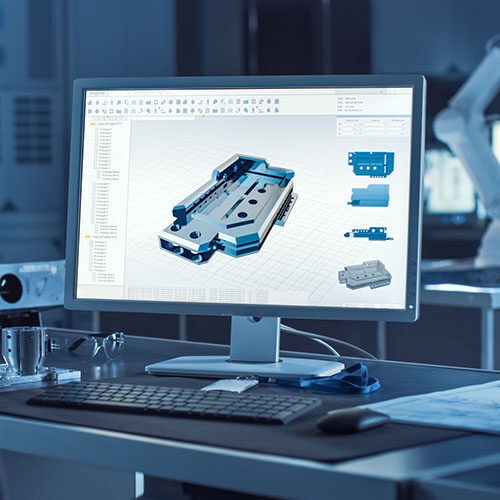
You may know all the ins and outs of manufacturing a quality product, but do you know all the ins and outs of marketing it?
A lot has changed over the last few years in the manufacturing industry, including how manufacturing businesses need to market themselves. Since 2020 there has been a marked increase in internet and email usage by manufacturing and industrial companies — meaning businesses are relying more on digital marketing and less on word-of-mouth than they did in the past.
Now, we’ll never say that marketing should be the core of your business, but it’s important in today’s competitive marketplace to have a keen understanding of marketing and to know the best ways to reach your target customer.
Over the next few weeks, we’ll explore marketing for manufacturers in more detail and delve into topics ranging from your website to tradeshows to YouTube. But today, we want to give you a primer on what’s to come, plus a few basics about the changing marketing landscape for manufacturers.
Inbound Marketing
In the past, most manufacturers relied on more traditional sources for leads and customers, including word-of-mouth and tradeshows. While these are still valuable sources for manufacturers, there is a whole new world of digital marketing out there.
Digital marketing for manufacturers is the process of developing and carrying out a strategy to market your company and its products online. A well-executed strategy can help you expand into new markets, get more quality leads and customers, increase sales, and raise brand awareness.
What Is Inbound Marketing?
Inbound marketing is all about bringing customers to you.
Inbound marketing aims to meet potential customers’ needs by creating relevant content that attracts visitors to your website so they can learn more about what you have to offer on their own time and at their own pace. It involves creating valuable content and online experiences tailored to your potential customer — rather than only depending on word-of-mouth referrals and expensive trade exhibitions to drive new business.
While it may seem daunting when you are first starting out, inbound marketing allows you to reach your potential customers at the right stage of their purchasing process and is made easier with the help of good content like a quality website, informative blogs or eBooks, social media posts, and email campaigns. When done well, this strategy can help move your target customers through their buyer’s journey and turn them into loyal and enthusiastic clients.
Inbound marketing is crucial in today’s competitive manufacturing industry, as it not only provides informative and insightful material that highlights your expertise and positions you as a knowledgeable and helpful business partner but — more crucially — it fits with how industrial and B2B customers do business in the modern world. A whopping 57% of the buying decision-making process is made before a customer even contacts a supplier.
This means that potential clients are researching, analyzing, and evaluating you well before they ever get in touch — so you better make a good impression online.
How Do I Use Inbound Marketing in My Shop?
Setting up a digital marketing strategy as a small or mid-sized manufacturing business can be intimidating, especially if you don’t have a dedicated marketing department. But we’re here to help! Remember, not everything has to be done right from the start. But, with some dedicated effort, you can build a strong strategy over time — and begin to reap the results of your hard work.
Before you create a full-fledged marketing strategy, first spend some time thinking about both who your potential customers are plus what their buyer’s journey is like.
Define Who Your Customers Are
To create content pertinent to your audience and keep you front of mind, it is essential to have a thorough grasp of your buyer and their motives. Take a minute to ask yourself (and everyone in your shop) who are our customers? What are their needs, habits, goals, and challenges?
You may even want to develop target personas, which are fictionalized representations of your ideal client based on data collected from your current clients and market research. Manufacturers generally have more than one target buyer persona, such as procurement managers, engineers, operational managers, etc., so you will want to create content that speaks to each.
Define Your Buyer’s Journey
Your buyer’s journey is just that — the process your buyer moves through when they decide to buy a product from you. It starts with them identifying their need, researching potential suppliers, and evaluating and making the final purchase decision. Often manufacturers deal with very specific needs and long sales cycles, which can be challenging, but you can still create relevant and engaging content for your customers and help them to get to know you through your website, online business listings, case studies, and social media.
Create a Marketing Strategy
Once you have a good grasp on your target customer and their buyer’s journey, you can start to create a marketing strategy.
To make sure you’re optimizing your time and effort — and you can track your progress — it’s critical to first set some goals for your marketing strategy (for example, increase leads by a certain percentage each quarter). Then, you should specify the particular approach or approaches you plan to use to accomplish your objective(s). With well-defined goals, as you carry out your strategy, you can measure your progress, evaluate what’s working, and know when to change things up when things aren’t.
Manufacturing Marketing Strategies
Manufacturing companies can use a combination of marketing techniques and strategies to accomplish their goals. Over the next few weeks, we will look at these in more depth, but to give you a quick overview, here are some common (and effective) marketing strategies for manufacturers:
1. Google Business Profile
Online visibility is a must. Maintaining your company’s relevance on Google is crucial for attracting new clients. Utilize your Google Business Profile to take charge of your online visibility.
2. SEO
Did you know that the top three Google results get 100x as many clicks as ALL of the page two results combined? SEO helps you get found by Google — so your customers can find you.
3. Website
A high-quality website is one of, if not the most essential, tool you can have. It’s where all of your marketing channels should point to — so it needs to be filled with great content for your potential customers.
4. Email Marketing
Manufacturing marketing is often a long game, but email marketing, such as newsletters and campaigns, can help to keep you front and center.
5. PPC and Google Ads
PPC, or pay-per-click, and Google ads can help you to expand your reach and get seen by more customers (especially when you are still working on building up your SEO game).
6. Tradeshows
Tradeshows used to be the bread and butter of the manufacturing industry, and they are still an important way to meet and connect with potential customers. Learn how to stand out at important events.
7. Social Media
Another platform where you can boost brand recognition and consumer loyalty is social media. It lets you connect with potential clients more naturally, in an online space they are probably already using.
8. YouTube
Millions of hours of video are watched daily by consumers — and it has been shown that this kind of content increases reach, engagement, and clicks. Consider adding videos on YouTube to expand your audience.
Conclusion
Creating an effective marketing strategy will take time and effort — but it will also help you to increase your brand awareness, enhance customer loyalty, expand your audience — and ultimately increase your sales. Stick with us over the next few weeks to learn more about marketing and how you can use it in your manufacturing business.
Get your eBook Scared to implement a new ERP?
"*" indicates required fields



